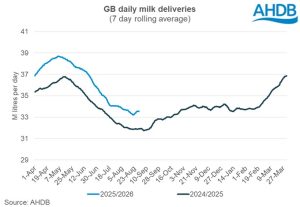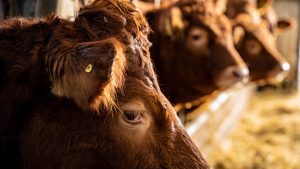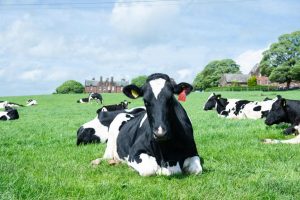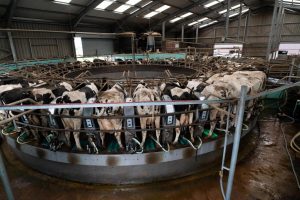
The government has acknowledged this labour challenge and put forward solutions which include tweaking policies relating to recruiting from overseas to fill the 12.2% vacancy rate.
In contrast, Paul Harris, a consultant with expertise in staff recruitment and retention on UK farms, reckons it is up to dairy farmers to take more ownership of the issues that are putting people off from working on their farms.
“The government report into the labour shortage focuses on resolving the access to overseas workers,” says Mr Harris, managing director of recruitment and staff management consultancy Real Success.
“While the macro issues still need to be addressed, they alone won’t resolve the systemic issues we have, in that UK staff simply don’t want to work in our sector and staff turnover is far too high.”
Farmers are the key to changing perceptions of the industry, he believes, and he has produced a comprehensive strategy to facilitate that.
The document addresses issues ranging from better communication and safer working practices to training and improving working conditions.
Mr Harris also wants action at an industry-wide level.
“There is a clear need for a farming-specific accreditation that recognises the efforts made by a farming business to support, develop and value their staff,” he says.
Solutions for staff recruitment and retention advocated in Mr Harris’ report are largely based on a shift in mindset by farmers on a range of key issues.
Cost
Farmers should see labour as an investment in the future of their business, and not a cost that must be reduced.
Although Mr Harris recognises that costs must be controlled, he sees labour as an essential investment.
“Thinking needs to shift from staff being a cost to a return on investment, similar to that when assessing investment in buildings, stock and machinery,” he says.
Communication
Poor communication skills by farm leaders is the primary reason why workers leave a business, according to Mr Harris.
He suggests seeking to understand the team and their differences and similarities in communication styles.
“A flexible approach, understanding that a business needs a mix of personality styles and behaviours to succeed, produces a better balance, reduced staff turnover and improved farm performance,” he says.
Staff appraisals
Commit to a review process for one hour every year for every staff member.
Run a structured meeting, with notes taken and shared afterwards with the worker.
Encourage openness and honesty from both sides and agree objectives and, if required, key targets.
“Staff will often bring ideas forward that may not have been considered before,” says Mr Harris.
Working hours
His research suggests that on some farms, workers are rostered for 12 days continuously before having a day off.
By having labour levels that are slightly higher than needed, staff, including owners and family members, are able to take time off, cover sickness absence and undertake training, staff meetings and off-farm events.
Raise farm’s public profile
If a farm wants to be discovered in job searches, it needs to be visible online.
This can be achieved through outsourcing the job of creating a social media presence and/or a simple website, or by farmers building the technical skills to do it themselves.
This will promote the farm to potential new recruits who are searching for a role.
View staff as an asset
While livestock and land are key components of a farm business, staff are its most vital asset, says Mr Harris.
Farmers who “talk staff up”, not down, are seen to be those who are more invested in their teams and become the employers of choice.
Training
Continually assess training needs and put in place measures to build skills within the farm team.
“From joining discussion groups to on-farm training days, demonstrating a clear investment in staff is likely to bring a return on this investment directly into their performance and will increase the likelihood of them remaining on the farm,” says Mr Harris.
A training agreement can be drawn up, specifying whether training costs must be repaid if a member of staff leaves the farm within a specific period.
Working conditions
Create a comfortable space where staff can eat, drink and rest.
Provide an additional area for people to remove their overalls and boots, and, if possible, another space for meetings.
Farm accommodation
Providing accommodation can be a deal maker for people relocating from other areas – an enticement rarely provided in other industries.
According to the Homelet rental index, in April 2022 the average house rental in the UK was £1,092 a month – equivalent to about £17,000 a year before tax.
“When household bills are also funded by the farm, dairy farming is one of the most lucrative careers in the UK,” says Mr Harris.
Alternatively, a housing allowance can be paid as part of an employee’s salary.
Safe working environment
Farm owners and managers should lead from the front, Mr Harris insists, from wearing helmets on quad bikes to using the correct safety wear and equipment for different tasks.
“Health and safety must be considered with the seriousness it deserves,” he says.
Recruit the right people
Taking on people with less experience and training them often produces the best results, Mr Harris advises.
Provide an employment contract
An employer must by law provide a statement of the principal terms and conditions on the first day of employment, and a wider written statement within two months.
That statement should include details of disciplinary and grievance procedures, along with all the essential elements of the working relationship such as working hours, holidays and sickness.
Clearly outline essential terms and conditions in an offer email or letter.
Ideally, provide a full employment contract or statement of terms and conditions on the first day of work.
First impressions count
Carry out a “farm appearance audit”.
A tidy farm suggests a tidy business, so make the first impression count, Mr Harris recommends.
10-point recovery plan for staffing on UK dairy farms
Mr Harris believes there is a need for a formal cross-industry approach to solving the labour shortage, with specific strategies.
He has drawn up a 10-point plan:
- Implement a “best practice” approach to people management based on research from multiple sites across the UK, to inform a blueprint for people management in the dairy industry
- Create a farm accreditation programme in collaboration with other agencies, with a “Preferred Employer” mark of excellence
- Support farm owners and managers through a workshop-driven people management programme
- Develop a programme to train farmers in presentation and speaking skills to enable them to engage confidently with their local communities, schools and colleges
- Provide free-to-access employment resources including staff handbooks, policies and procedures, right to work checklists and employment contracts
- Provide a recruitment blueprint with clear methods for effective recruitment
- Develop and deliver farmer training workshops in interviewing skills
- Work with the FarmIQ platform to provide online courses that allow farmers to learn people management skills in their own time
- Teach farmers about effective communication though on-farm workshops
- Establish a cross-sector task force to deliver workshops and seminars for developing people management skills

























